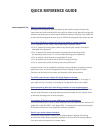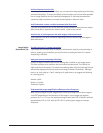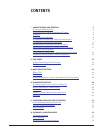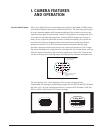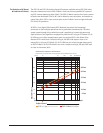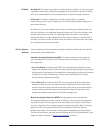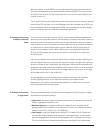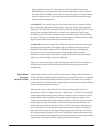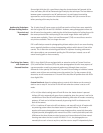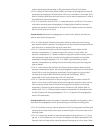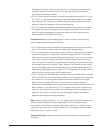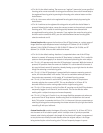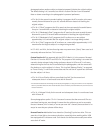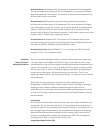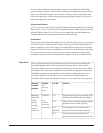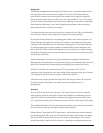
I. CAMERA FEATURES AND OPERATION 11
Autofocusing Techniques:
Off-Center Focusing Points vs.
“Focus Lock and
Recompose”
Fine-Tuning Your Camera
with Custom and
Personal Functions
Some might
think that it’s a good idea to keep the shutter button half-pressed all the
time, b
ut battery life will be shortened significantly by that technique. The best balance
betw
een power consumption and AF performance is to anticipate picture-taking
op
portunities and do not press the shutter button halfway until just a second or two
bef
ore pressing all the way for the shot.
The 45-point Area AF sensor covers a significant portion of the picture area, especially
with the original EOS-1D and EOS-1D Mark II. However, many photographers never use
the off-center focusing points, preferring the old-fashioned method of locking focus with
the center point and then recomposing for the actual image. Before multi-point AF
cameras were available, “Focus Lock and Recompose” (FLR) or manual focus were the
only choices available. That’s no longer the case.
FLR is sufficiently accurate for photographing distant subjects, but it can cause focusing
errors, especially backfocus, when photographing subjects within about 15 feet of the
camera. This is often the case during portraiture. For optimum focusing performance
with close subjects, we recommend avoiding the FLR technique. Instead, use an off-
center focusing point or focus manually.
EOS-1 class digital SLRs are equipped with an extensive variety of Custom Functions
(C.Fn) and Personal Functions (P.Fn) that allow photographers to tailor many aspects of
camera operation according to personal preferences. Although there are minor
differences in the quantity and variety of C.Fns and P.Fns according to individual camera
models, most of them are consistent across the product line. For the purposes of this
document, we will concentrate on C.Fns and P.Fns that affect AF performance with EOS-1
class digital SLRs.
Custom Function 4 allows the photographer to control which button on the camera is
used to start or stop AF. It also ties in with AE Lock when the camera is set to an AE
mode.
• C.Fn 4-0 (the default setting) starts AF and AE when the shutter button is pressed
halfway. AE Locks automatically upon focus completion when the camera is set for the
combination of One-Shot AF and Evaluative Metering. With other AF modes or metering
patterns, AE Lock can be initiated manually by pressing the AE Lock button on the
back of the camera.
• C.Fn 4-1 switches AF start to the AE Lock button, and starts AE Lock in AE modes with
any metering pattern when the shutter button is pressed halfway. This mode is
popular with sports photographers and some photojournalists, especially those who
originally learned photography with manual focus SLRs. It works particularly well with
USM lenses that have distance scales, because such lenses feature full-time manual
focusing even when the lens is set for AF. With C.Fn 4-1, the photographer can
manually focus such a lens at any time, and then start or stop AF independently from



